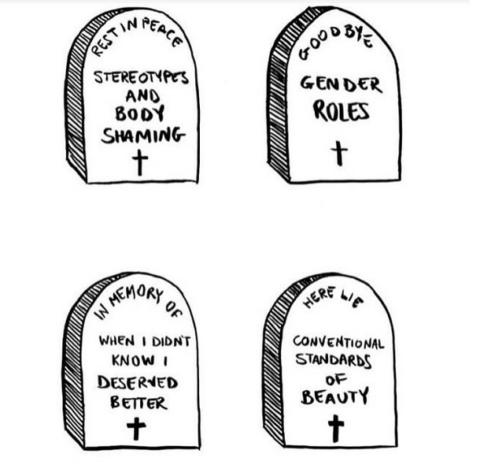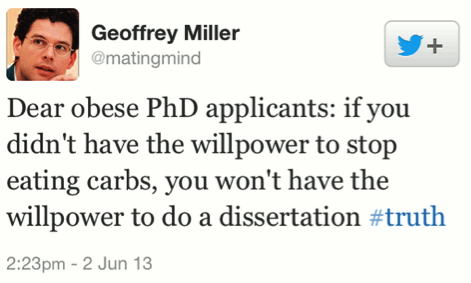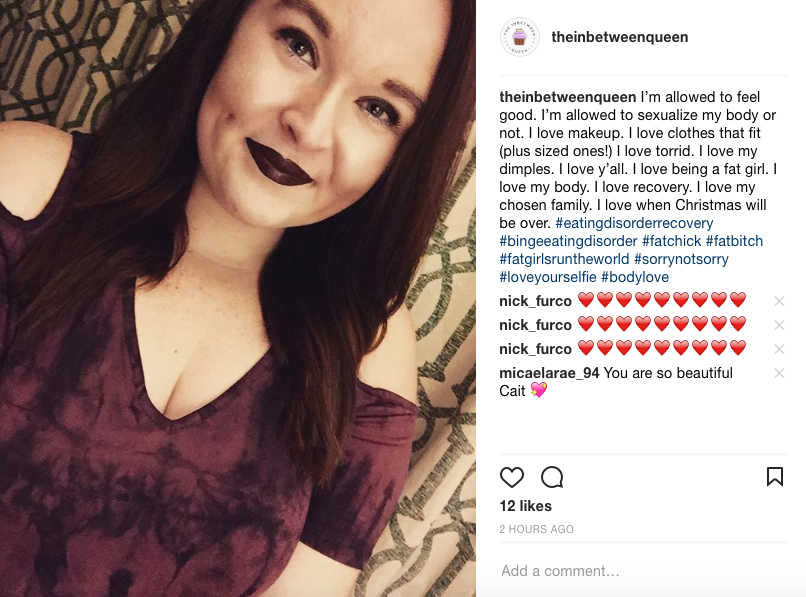I’m so excited to be co-authoring this week’s post with the awesome body positive mental health advocate, fellow content creator and recovery warrior Lexie Manion!
One of her Instagram posts about being in a larger body and not fitting into a lot of the spaces that thin people can fit into inspired me to ask her to co-write this post with me. We’ll share our experiences about spatially exclusive items that thin people, for the most part, use every day without a problem.
https://www.instagram.com/p/BfXZAsLhzbr/?hl=en&taken-by=lexiemanion
The idea that there are certain everyday items, places, arrangements, and accommodations (publicly accessible things) that are not even a second thought for thin people is one of the many examples of thin privilege.
In its most basic form, thin privilege is used to describe how thin people in society are commonly accepted — even celebrated. Thin people have the upper hand in many everyday parts of life, including physically and metaphorically fitting in with ease, having no issues shopping for clothes, eating food without being questioned, “are you sure you want to eat that much?”
There’s this fallacy that gluttony and laziness are the true problems that make fat people fat, which is so far from the truth. Unintentional weight gain or weight distribution throughout the body can be caused by aging, medications, physical illness, mental illness, and what Evelyn Tribole and Elyse Resch call our individual “genetic blueprint. (Intuitive Eating Principle #8).
It’s a shame the general public denies that many fat people are actually fat because of circumstances beyond their control, and that diet programs are one of the only products in our consumer market that blame the user for a receiving a defective item.

It’s worth saying that in our diet culture, not every fat person wants to lose weight. Each person’s health and wellness is their own. I (Lexie) personally can not recall anytime I’ve heard a fat person shame a (thin) person who smokes or drinks excessively.

Correcting other people’s behaviors or assumptions about their behaviors, especially strangers, can never be justified because it’s rude, unnecessary and counterproductive. Meeting a perceived problem with judgmental eyes will never help.
It’s also worth saying that the fat acceptance movement isn’t going around demanding that every single person be fat or live in a larger body–but that society at large is demanding that everyone be thin, fit, eat “clean” (ugh), and have a certain ideal body type that requires taking up less space. The fat acceptance movement is the thinspo, fitspo and thin privilege clapback, not a demand to standardize fatness.
And when we discuss thin privilege in the Body Positive community, it echoes the similarities of other unearned privileges of identity such as white privilege, able-bodied privilege and heterosexism. Admitting that we have this privilege isn’t a bad thing either (another fallacy). Lexie–a white and able-bodied person; Cait–a white and able-bodied cis person; Stating our privileges is acknowledgement that while we are all created equally, not all bodies are created–or socially treated–equally. Racism, sexism, ableism and fat discrimination are all very alive and well in our world.

The same message is spread when fat people can’t access certain things in public spaces, or even in private spaces, that affirm their bodies and make them feel like they belong there. Let’s take a look at some examples:
Straight Size Clothing
Lexie: I am a huge Demi Lovato fan and was checking out her merch for her past tour a couple months ago. Sadly, her store doesn’t even accommodate to my XXXL/XXXXL size. What irked me though is that a fan could buy an XXL shirt, but there is a catch. We all know that singers and celebrities over-charge for their merch already (because they can because the fans are so loyal!). So, get this: for $34.95, plus an additional $2.95 (shipping not included), you can be the proud owner of a Demi Lovato shirt (if you can fit into an XXL, of course)!

Cait: This interests me to hear about Demi’s clothes and merch, considering she is a person in recovery. That brings me to another issue: the idea that bigger bodies aren’t the ones with “real, medical eating disorders” and that we all just lack willpower and self control and that that somehow makes us less of a person.
At almost every store I go to, there is a plus size ‘section’ full of maybe an area of clothes that fit me that’s no more than double the size of my bedroom. And everything that fits plus size women like me is always in an irrationally unfashionable assortment of animal print. As someone whose style leans more toward the fat version of Janis Joplin, I don’t want to look like a bloated cheetah or a zebra or Sylvia Fine from The Nanny. And I most certainly don’t want to be charged more for it.

Transportation
Cait: I haven’t been on an airplane in a couple of years, but I’ve heard so many stories from women who are larger than me about being charged for needing to buy two seats on a plane just to be able to travel. For a lot of people, this extra money is a hardship; and it’s unfair that a person has to have more money to take up more space. This has become a phenomenon by passenger rights advocates known as the “fat tax.” (read more from this BBC article).
Trains are different, though. I see a lot of weirdness on the LIRR as a native Long Islander. For instance, there are fold-down seats for folks who have disabilities and their caregivers so that they can access the train and get on and off without a hassle–fitting their wheelchairs if need be. Plenty of able-bodied people occupy these spaces when there are no room in the standard seats provided. I’ve seen people get really perturbed about having to sit next to a fat person on the train, because the amount of space they take up is met with judgment--but the same level of annoyance doesn’t get expressed for thin people who put their bag next to them on a seat or who do things that are just not generally so courteous. Fatphobia runs rampant in public spaces; and it boils down to simply prejudice.

Academia
In a recent Food Psych podcast episode that Christy Harrison did with activist (almost) Dr. Joy Cox, she discusses the idea that desks and seating arrangements in higher education–and for that matter, secondary and public education–aren’t accessible for large bodied people.
Fat studies and health at every size has also barely entered the realm of academic discourse as a branch of social justice/sociology/studying discrimination. Joy talks a lot about how weight is not yet a federally protected class and how this ideology spills over from the idea that weight and body size fully function as a choice.

I (Cait) having sat through six years of higher education and having a semester to go on my Masters, have never truly, totally embodied this problem, as I was often small enough or “just fat enough” to be able to fit. But what happens when we add arms and non-movable desks to seating in academia, where fat bodies can’t fit in the space between? We close out academic access to fat people and perpetuate their lack of access to education. And denying someone access to education is one of the many systemic realities of discrimination.
Fat people aren’t any less able to learn or get degrees because they are somehow less competent, smart or capable–they are locked out because they literally don’t fit in.
As a teacher, access to information, good professors, life-changing classes and academic discourse means THE WORLD to me. I don’t know what I would have done without one of the last classes of my undergraduate program, entitled Feminist Pedagogies. In this class, though it wasn’t pertinent to me yet, we did touch SO MUCH on embodiment and the idea of education as a visceral process; one that fat people aren’t entitled to until they conform to yet another standard of cisnormative, heteronormative white classist privileged education systems in America. And luckily, we sat at tables with armless chairs; so the space itself was fat friendly, but I can’t say the same for all the learning spaces in either my undergraduate or graduate work institutions.
In order to combat this, we HAVE to include weight and body size in collegiate and academic rhetoric about diversity. Because discrimination against people of size is too real and too widely unnoticed. And in colleges across America where students are learning the value of multiculturalism and diversity, fat people are locked out or expected to change yet again.
Yoga
Lexie: As someone in recovery from an eating disorder, I was introduced to the yoga world early on; the treatment centers I went to offered a class here or there during the day. While there is no obvious size or weight limit to practice yoga or stand on a yoga mat, it’s very apparent that much of the yoga world seems to accept only thin women into their practice.
I know as a plus size woman that I can’t do every single pose perfectly (or at all), and thankfully there are modifications for fat people or people with injuries, people with mobility issues so they can more comfortably get into the position. However, fat shaming can easily carry into a yoga class consisting of one instructor and several other members.
https://www.instagram.com/p/BhnOmt_BUNu/
Fat people can feel out of place in yoga classes, especially if the instructor calls attention to it by showing the fat person additional support with or without their consent.
Cait: The criticism of yoga as an increasingly problematic space for body diversity is nothing new. In fact, it goes beyond the scope of fat and differently abled bodies.
Like Lexie, I gained weight and changed body shape in my recovery, which has kept me from accessing the poses I could once do when I was stronger, leaner, but also sicker. I was never able to do crow, but could do a pretty kick ass shoulder stand. And while I’m working on it and my rolls often get in the way, I sometimes have to stop my dysmorphia from beating me up about taking modifications. Yoga, or unity in Sanskrit, is about the process.
Yogis like Dianne Bondy and Jessamyn Stanley have talked extensively about the thin ideal that permeates a lot of yoga practices. Yoga for fitness (ugh) has become increasingly popular among thin, suburban white women, and it dilutes the spiritual practice that is the entire point of yoga in the first place. Yoga’s original intention was to help Buddhists, Hindus and the dozens of other meditating Eastern religions to be able to sit and meditate for longer periods of time. I am a regular yogi, a practicing Buddhist, and lover of yoga–but I am also an exercise bulimic and a recovering perfectionist.

I often have to remind myself that yoga is not about weight loss or weight redistribution or calorie burning, and that when I stray from my spiritual intention in the practice itself, I am effectively engaging in cultural appropriation.
If you’re struggling to take up space in this world, or the world is struggling to make space for you, demand it. So many movements have been successful in our culture to bring marginalized people into the forefront by them simply demanding space, and resisting the idea of being left out because of something that made them different.
If you struggle to give fat people space, try saying the word ‘fat’ as a non-pejorative term a few times in conversation. The word may trigger some people, but that’s a great place to begin. Find out why people find it so offensive, and remove its moral meaning from the understanding that diet culture has given you about fatness. Bust down the stigma that is associated with it; and learn to just let people live their lives.
So much of what I see on the internet surrounding peoples’ discomfort with the fat acceptance movement and their willingness to only allow “acceptably fat” bodies into the body positivity sphere is exclusionary, and turns out to not be very positive for a lot of people at all.
The rest is straight up hateful. But that’s to be expected when you don’t understand something. Just look at Google:

Read books like Body Respect (which Cait recommends all the time across this blog!) and take the body respect pledge; not just for other people around you, to help you combat fat shaming and weight stigma…but turn that ish inward, too. Too often when we try really hard to learn about and accept others, we forget ourselves.

Have a great week, y’all!
xo,
Cait & Lexie






